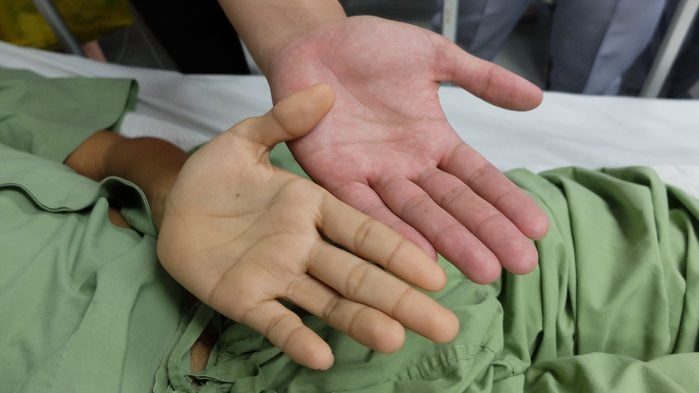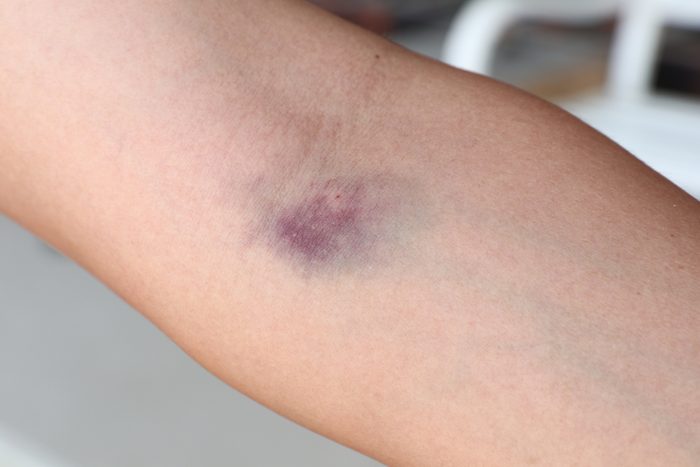Cancer comes in many shapes
You won’t always get a lump or a bump with cancer. The signs can be much less obvious, according to the National Cancer Institute. However, keep in mind that many of these so-called cancer symptoms can also be due to other benign or non-cancer-related health issues as well. It’s key to discuss any of the following symptoms with your doctor for a proper diagnosis.

A lump in the front of the neck
A suspicious neck lump could be a sign of lung, throat, thyroid, or breast cancer as well as leukemia, Hodgkin’s lymphoma, and some forms of skin cancer. While the lumps can be benign or non-cancerous, they’re a bigger concern if you also have risk factors like smoking, drinking, or you’re getting up there in years. Michael Tuttle, MD, an endocrinologist with Memorial Sloan Kettering Cancer Center, says to pay attention to how the lump behaves. “The trick is [thyroid nodules] move up and down when you swallow,” Dr. Tuttle says. “Most other lumps don’t move.” Here are the 6 other thyroid cancer symptoms you should never ignore.

Yellowing skin
Jaundice is the medical term for yellowing skin and eyes, and it comes from bile buildup—an indication that your body isn’t able to break bile down. “Jaundice is one of the clearest symptoms of pancreatic cancer,” says Christopher DiMaio, MD, a gastroenterologist at The Mount Sinai Hospital in New York City. “Often, patients feel fine until one day a friend notices their eyes look yellow, then they go to the doctor and find they have advanced pancreatic cancer.” Jaundice can also cause your skin to itch, according to the American Cancer Society (ACS). Yellowing skin is a symptom of gallbladder and liver cancers, as well as many other diseases and conditions.

Noticeable changes in a wart or mole
Changes in color, shape, or size, of a wart, mole, or freckle could be melanoma, a type of skin cancer. Having fair skin is a primary risk factor, although people of any skin color can get a melanoma; see a dermatologist yearly, particularly if your complexion is fair, you have a family history of melanoma, or you have more than 50 moles on your body, recommends dermatologist Anna Di Nardo, MD, PhD, of the University of California, San Diego. If any freckles, beauty marks, or moles start to bleed, speak with your dermatologist. Here are 7 other skin cancer symptoms you should check for now.

Persistent stomach or abdominal pain
You may think your abdominal pain is simply indigestion or period cramps. However, if the discomfort locates itself in the upper-right abdomen region, this could be a symptom of gallbladder cancer. Persistent stomach cramps could also be a symptom of leukemia or esophageal, liver, pancreatic, colorectal, or testicular cancer. These other symptoms could be gallbladder cancer.

Stomach bloating
Ovarian, pancreatic, stomach, colon, liver, uterine, and breast cancers could all cause severe abdominal bloating. “With ovarian cancer, not only can tumors grow quite large, but they can result in fluid growing around them, which can cause pretty dramatic abdominal extension,” says Amanda Fader, MD, associate professor and director of Kelly Gynecologic Oncology Service at Johns Hopkins Medicine. If your abdomen is growing while your face and arms are losing muscle and fat, it may not be just weight gain.

Persistent headaches
Telling the difference between a common headache and headaches from cancer is challenging—even for doctors. The best indicator of cancer, however, is a new daily headache that won’t go away with treatment, such as over-the-counter painkillers, according to Mike Chen, MD, PhD, associate professor in the division of neurosurgery, department of surgery, at City of Hope in California. “These headaches tend to get worse over time and often happen first thing in the morning when intracranial pressure is high from lying in bed for long periods of time,” he says. However, there’s no specific type of headache that can predict whether or not a person has a brain tumor. Cancers in the brain, spinal cord, and upper throat, as well as some forms of lymphoma, pituitary gland tumors, and other cancers that spread to the brain, may also cause headaches.

Difficulty forming words
Oral and brain cancers can impact speech, especially ones in the frontal or temporal lobes. People can lose basic motor functions like speech and language comprehension and end up stuttering or have difficulty naming objects, says Christopher Carrubba, MD, co-director for medical education at Med School Tutors. In the case of oral cancer in your lips, gums, tongue, and throat, speech problems occur if cancer changes how any part of your mouth moves.

Abnormal bleeding from your reproductive tract
“The most common subtle signs of cervical cancer are abnormal bleeding of any kind,” says John Moroney, MD, associate professor in gynecologic oncology at the University of Chicago. This includes bleeding in between periods, heavier-than-usual menstruation, or bleeding after menopause. Other cancers that cause abnormal vaginal bleeding are cervical, uterine, and ovarian cancers. These are the 8 silent signs of cervical cancer.

A painless lump in your testicle
One of the most common testicular cancer symptoms is a pain-free mass in the testis, according to Joseph Harryhill, MD, a clinical associate professor of urology at the University of Pennsylvania. “It is important for men to realize that a tumor often does not cause any significant discomfort—thus the importance of regular testicular self-examination,” Dr. Harryhill says. Many times men will not notice the mass until they receive an unrelated injury, bringing the tumor to their attention. Moral of the story: Make sure you check yourself regularly for lumps and bumps. Here are other symptoms of testicular cancer.

Fatigue, weakness, and lethargy
Leukemia and brain tumors can cause cancer-related fatigue. For people with leukemia, this is usually because of anemia (a deficiency of red blood cells), which only compounds the physical exhaustion. People with a brain tumor, however, experience weakness and lethargy due to disrupted nerve signals. There are also some colon or stomach cancers that can cause blood loss that leads to fatigue, according to the ACS. The later stages of kidney cancer will also rob energy, reports the Mayo Clinic. Don’t miss these other brain tumor symptoms.

Chronic coughing
If you have a persistent cough for more than three weeks without other cold or allergy symptoms, it could be an early sign of lung or throat cancer. (However, there are many other causes of a chronic cough, including asthma.) Leukemia can also cause symptoms that seem like bronchitis or a bad chest cold. Not surprisingly, coughing up blood can be another cancer symptom, especially if it’s bright red and looks bubbly from mixing with air and mucus. Here are 6 more early throat cancer symptoms you should know.

New, dark nail marks
Melanoma of the nails—officially known as subungual melanoma—hits up to 3.5 percent of people with melanoma. Rare as it is, it’s crucial to remember this telltale sign: a dark black or brown line across a fingernail or toenail, according to the American Academy of Dermatology (AAD). Here are 7 other things your fingernails reveal about your health.

Blood or blood clots in your urine
Leukemia, bladder cancer, prostate, and kidney cancer could all cause blood in your urine—and so it’s not something to ignore. Blood in the urine is the most common sign of bladder cancer, notes Gary Steinberg, MD, a urologist and urologic oncologist at NYU Langone Health’s Perlmutter Cancer Center. (Blood in the urine can also be a sign of a urinary tract infection (UTI) or other conditions.) The blood doesn’t always have to look bright red. Sometimes, it looks brown, like the color of cola. If you notice blood in your urine, see a doctor right away.

Pain or burning when urinating
Pain or a burning sensation during urination can be an indicator of bladder cancer. (Or also, more commonly, a UTI or another condition.) “Many patients, especially as we get older, will have changes in our urination,” says Dr. Steinberg. Gradual changes are OK, but if you suddenly experience new, uncomfortable symptoms, see a doctor right away. Here are the silent signs of bladder cancer you might be ignoring.

A shift in bowel habits
This is one of the most obvious symptoms of colon cancer, according to the American Cancer Society (ACS). If you have issues with long-term constipation, diarrhea, or a difference in stool size, speak to your doctor. This can be a symptom of many other conditions, but could also be a sign of ovarian cancer, either because the disease has spread to the colon or has triggered the buildup of fluid in the area.

Subtle vision loss
Cancers that start in the brain or spinal cord—or have spread there—may cause blurred vision, double vision, or vision loss, reports the ACS. Patients often won’t notice the issue until they realize they’re continually bumping into things on one side of their body, or have repeated car accidents on the side suffering damage. (Here are 14 possible causes of blurry vision.) Read about the other surprising diseases eye doctors can diagnose first.

Unusual vaginal discharge
Uterine or cervical cancer could cause out-of-the-ordinary vaginal discharge. Persistent discharge that has a different color, or that has an odor, could be the result of dead or dying tissue, says Tracy Scheller, MD, a gynecologist in Englewood, New Jersey. It’s normal and healthy for discharge to change throughout the month, and it can vary in thickness, opacity, and consistency. But any vaginal discharge that is pale, watery, foul-smelling, brown, or bloody could be a sign of cervical cancer. These are the other signs of cervical cancer you should know.

Shortness of breath
Like so many cancer symptoms, this one’s indistinct: Shortness of breath could mean leukemia, lung cancer, or nothing at all. As their disease worsens, leukemia patients might experience—in addition to fatigue and weakness—shortness of breath that stems from anemia or, in much rarer cases, masses in the chest. For people with lung cancer, shortness of breath can come from a tumor blocking the windpipe or an accumulation of fluid in the chest, says Raja Flores, MD, professor, and chairman of thoracic surgery at Icahn School of Medicine at Mount Sinai in New York City. Trouble breathing when you’re sitting or lying down can also be a sign of trouble. Here are other leukemia symptoms you should know.

Losing weight without trying
An unexplained weight loss of ten pounds or more may be the first sign of cancer, according to the ACS. This happens most often with cancers of the pancreas, stomach, esophagus, lung, and liver. However, most people with cancer will lose weight at some point, according to the ACS. Here are 8 other silent signs of liver cancer.

Appetite loss
If you find yourself getting full faster and unable to eat as much as you normally would, you might be dealing with ovarian cancer symptoms, according to Kevin Holcomb, MD, director of gynecologic oncology at Weill Cornell Medicine. In fact, most cancers will interfere with your appetite since they often trigger changes in your metabolism. Stomach, pancreatic, colon, and ovarian cancers can put pressure on your stomach and make you feel too full to eat. Excess fluid in the belly can make you feel full faster if you have liver cancer.

A persistent sore throat
If you’re not sick but can’t seem to kick that scratchy sore throat, it could be one of the early symptoms of throat cancer. (Keep in mind there are many things that cause a sore throat that aren’t cancer.) Tumors that form in the area below the vocal cords often cause this throat cancer symptom, according to the ACS.

Changes in your voice
A hoarse voice could be the symptom of lymphoma or throat, lung, larynx, or thyroid cancer. Sometimes, hoarseness is a later symptom of breast or lung cancer that spreads and presses on nerves near the voice box, according to ACS. If the hoarseness doesn’t go away within two weeks, see a doctor. These 9 uncommon signs of lung cancer you need to watch out for.

Back pain
This symptom is very common and most often not due to cancer. (Here are 9 reasons you can have back pain, including stress.) However, people with colon, rectum, or ovary cancer can have back pain, reports the ACS. People with lung cancer may also have back pain—pressure from a tumor can put stress on the back. A similar thing happens for people with cervical, bladder, or pancreatic cancer. Most often, however, back pain due to cancer means it has already spread or grown and mostly likely is accompanied by other symptoms, warns the ACS.

Excessive or spontaneous bruising
Everyone gets the occasional bruise—but if you have excessive, unexplainable bruising in strange places, this could be an early sign of leukemia, according to the Cancer Treatment Centers of America. Over time, leukemia impairs the blood’s ability to carry oxygen and clot, and this can lead to bruising. These are the 15 other cancer symptoms women are most likely to ignore.

Dark urine
Cancer in the kidney, pancreas, or liver could cause dark urine, according to the ACS. The same bile buildup that contributes to jaundice or yellowing skin gives urine a darker color. Here are other symptoms of pancreatic cancer.

Nipple discharge
If you’re breastfeeding or pregnant, breast discharge is likely nothing to worry about. Otherwise, any discharge should be checked by a doctor; after a lump, nipple discharge is the more common breast cancer symptom. Spontaneous nipple discharge that’s anything other than clear in color could be a cause for concern. These are the 9 other breast cancer symptoms that aren’t lumps.

Fever
Any time your body temperature rises, it’s a sign that your immune system is battling some kind of intruder. That could be a virus, bacteria, or potentially a tumor. Persistent and reoccurring fevers that can’t be explained by cold or flu symptoms should be evaluated by your doctor. In rare cases, fever is an early symptom of blood cancers such as leukemia, lymphoma, as well as kidney cancer. Here are more hidden signs of kidney cancer.

Sores that don’t heal
Long-lasting mouth sores could be oral cancer and should be treated right away, warns the ACS, especially in people who smoke or drink alcohol often. Some skin cancers may bleed and look like sores that haven’t healed.

White patches in the mouth or on the tongue
These patches could be leukoplakia—a pre-cancerous condition that could progress into mouth cancer if left untreated. Mouth-irritating habits like smoking or chewing tobacco often cause leukoplakia, reports the ACS. The patches slowly develop over weeks or months and can be hard to scrape off.

Trouble swallowing
This is one of the most common esophagus cancer symptoms, though it can also turn up in people with throat, stomach, or lung cancer. The ACS says that people might feel like food sticks in their throat or that they are choking on it. People with this symptom might unknowingly take smaller bites of their food or change their eating and diet habits to make swallowing easier. Read about the 59 health symptoms you should never ignore.
